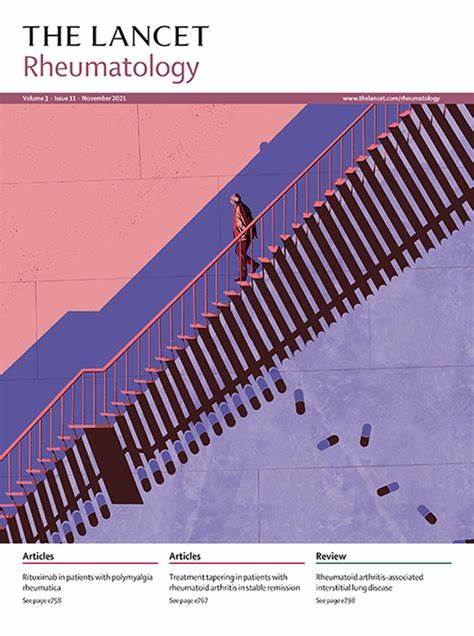Dual JAK and ROCK inhibition with CPL'116 in patients with rheumatoid arthritis with inadequate response to methotrexate: a randomised, double-blind, placebo-controlled, phase 2 trial
IF 16.4
1区 医学
Q1 RHEUMATOLOGY
引用次数: 0
Abstract
Background
Janus kinase (JAK) inhibitors are an effective treatment option in rheumatoid arthritis and other autoimmune diseases. However, the use of JAK inhibitors is associated with increased total cholesterol, LDL cholesterol, triglycerides, and creatinine kinase, reducing the net clinical benefit of using them. Adding Rho-associated protein kinase (ROCK) inhibition to JAK inhibition might provide cardioprotection as ROCK inhibitors have been shown to reduce vascular inflammation, improve endothelial function, and prevent cardiac remodelling in preclinical models. In this study we investigated CPL409116 (hereafter referred to as CPL'116), a novel dual JAK and ROCK inhibitor, in patients with rheumatoid arthritis with inadequate response to methotrexate, to assess dose-dependent effects on disease control, pharmacokinetics, and laboratory abnormalities among other safety events.
Methods
This phase 2, randomised, double-blind, dose-ranging, placebo-controlled, parallel group trial enrolled patients aged 18–75 years at nine hospitals or clinics in Poland and Ukraine. Main inclusion criteria were a documented diagnosis of adult-onset, moderate-to-severe rheumatoid arthritis for at least 6 months before screening, and inadequate response to current methotrexate treatment (oral or injected 15–25 mg once weekly, or ≥10 mg once weekly if reduced due to side-effects or intolerance). Participants were randomly assigned via an interactive web response system (1:1:1:1, block size of four, stratified by age) to oral CPL'116 (60 mg, 120 mg, or 240 mg) or placebo twice daily for 12 weeks, with continuation of background methotrexate. The primary endpoint of the study was the change from baseline in Disease Activity Score based on 28 joints and C-reactive protein (DAS28-CRP) at week 12, analysed with a mixed-effects repeated measures model by a modified intention-to-treat approach. p values were nominal. Safety parameters including adverse events, vital functions, and laboratory results were closely monitored and reported for the safety analysis population, comprising all participants who received at least one dose of CPL'116 or placebo. People with lived experience were not involved in the study. The trial was registered with ClinicalTrials.gov, NCT05374785, and is completed.
Findings
Between May 30, 2022, and Feb 7, 2024, 106 patients were randomly assigned (27 in the CPL'116 60 mg group, 25 in the 120 mg group, 26 in the 240 mg group, and 28 in the placebo group). Overall mean age was 54·4 years (SD 10·5); 79 (75%) of 106 participants were women and 27 (25%) were men, and all individuals self-reported as White. The least squares mean difference in the change from baseline in DAS28-CRP at 12 weeks with CPL'116 versus placebo was –0·15 (95% CI –0·81 to 0·52; p=0·67) for the 60 mg dose; –0·56 (–1·25 to 0·12; p=0·10) for the 120 mg dose; and –0·89 (–1·56 to –0·22; p=0·010) for the 240 mg dose. Thus the primary endpoint was met for the 240 mg dose only. Overall CPL'116 was well tolerated. Two participants had serious treatment-emergent adverse events (one in the 60 mg dose group [non-fatal non-ST-elevation myocardial infarction, deemed possibly related to CPL'116] and one in the 240 mg dose group [non-muscle invasive bladder cancer, deemed unrelated to CPL'116]); both events led to discontinuation of CPL'116. CPL'116 was also discontinued due to leukopenia which was deemed to be possibly related to CPL'116 in one participant who received the 240 mg dose. No severe adverse events or deaths were reported. No laboratory or haematology abnormalities were recorded at any CPL'116 dose.
Interpretation
The findings of this study suggest a dose-dependent response with CPL'116, with significant efficacy at the high dose of 240 mg twice daily. The drug was generally well tolerated and was not associated with lipid abnormalities or creatinine kinase increase. These findings warrant further investigation in larger studies and different clinical settings.
Funding
Celon Pharma and the National Centre for Research and Development (Poland).
对甲氨蝶呤反应不足的类风湿关节炎患者,CPL'116双重JAK和ROCK抑制:一项随机、双盲、安慰剂对照的2期试验
背景:Janus激酶(JAK)抑制剂是类风湿性关节炎和其他自身免疫性疾病的有效治疗选择。然而,使用JAK抑制剂与总胆固醇、低密度脂蛋白胆固醇、甘油三酯和肌酐激酶升高有关,降低了使用它们的净临床效益。在JAK抑制中加入rho相关蛋白激酶(ROCK)抑制可能提供心脏保护,因为ROCK抑制剂在临床前模型中已被证明可以减少血管炎症,改善内皮功能并防止心脏重构。在这项研究中,我们研究了CPL409116(以下简称CPL'116),一种新型JAK和ROCK双抑制剂,用于对甲氨蝶呤反应不充分的类风湿关节炎患者,以评估其对疾病控制、药代动力学和实验室异常等安全性事件的剂量依赖性影响。方法:这项2期随机、双盲、剂量范围、安慰剂对照、平行组试验在波兰和乌克兰的9家医院或诊所招募了年龄在18-75岁的患者。主要入选标准为:筛查前确诊为成人发病、中度至重度类风湿性关节炎至少6个月,对当前甲氨蝶呤治疗反应不足(口服或注射15- 25mg,每周一次,或≥10mg,如果因副作用或不耐受而减少)。参与者通过交互式网络反应系统(1:1:1:1,分组大小为4,按年龄分层)随机分配到口服CPL'116 (60 mg, 120 mg或240 mg)或安慰剂,每天两次,持续12周,并继续使用背景甲氨蝶呤。该研究的主要终点是第12周基于28个关节和c反应蛋白(DAS28-CRP)的疾病活动评分与基线的变化,通过改进的意向治疗方法使用混合效应重复测量模型进行分析。P值为标称值。包括不良事件、生命功能和实验室结果在内的安全性参数被密切监测并报告给安全性分析人群,包括所有接受至少一剂CPL'116或安慰剂的参与者。有生活经验的人没有参与这项研究。该试验已在ClinicalTrials.gov注册,编号NCT05374785,并已完成。研究结果:在2022年5月30日至2024年2月7日期间,106例患者被随机分配(27例为CPL'116 60 mg组,25例为120 mg组,26例为240 mg组,28例为安慰剂组)。总体平均年龄为54.4岁(SD 10.5);106名参与者中有79人(75%)是女性,27人(25%)是男性,所有人都自称为白人。CPL'116与安慰剂组相比,12周时DAS28-CRP与基线变化的最小二乘平均差异为- 0.15 (95% CI - 0.81至0.52;P =0·67);- 0.56(-1·25至0.12;P =0·10);- 0.89 (- 0.56 ~ - 0.22);P =0·010)。因此,仅240mg剂量达到了主要终点。总体而言,CPL'116耐受性良好。2名受试者出现严重的治疗不良事件(1名在60 mg剂量组[非致死性非st段抬高心肌梗死,被认为可能与CPL'116相关],1名在240 mg剂量组[非肌肉浸润性膀胱癌,被认为与CPL'116无关]);这两件事都导致了CPL'116的终止。CPL'116也因白细胞减少而停用,这被认为可能与一名接受240 mg剂量的参与者的CPL'116有关。无严重不良事件或死亡报告。在任何CPL'116剂量下均未记录实验室或血液学异常。解释:本研究结果提示CPL'116具有剂量依赖性反应,在高剂量(240 mg,每日两次)下具有显著疗效。该药一般耐受性良好,与脂质异常或肌酐激酶升高无关。这些发现值得在更大的研究和不同的临床环境中进一步调查。资助:Celon制药和国家研究与发展中心(波兰)。
本文章由计算机程序翻译,如有差异,请以英文原文为准。
求助全文
约1分钟内获得全文
求助全文
来源期刊

Lancet Rheumatology
RHEUMATOLOGY-
CiteScore
34.70
自引率
3.10%
发文量
279
期刊介绍:
The Lancet Rheumatology, an independent journal, is dedicated to publishing content relevant to rheumatology specialists worldwide. It focuses on studies that advance clinical practice, challenge existing norms, and advocate for changes in health policy. The journal covers clinical research, particularly clinical trials, expert reviews, and thought-provoking commentary on the diagnosis, classification, management, and prevention of rheumatic diseases, including arthritis, musculoskeletal disorders, connective tissue diseases, and immune system disorders. Additionally, it publishes high-quality translational studies supported by robust clinical data, prioritizing those that identify potential new therapeutic targets, advance precision medicine efforts, or directly contribute to future clinical trials.
With its strong clinical orientation, The Lancet Rheumatology serves as an independent voice for the rheumatology community, advocating strongly for the enhancement of patients' lives affected by rheumatic diseases worldwide.
 求助内容:
求助内容: 应助结果提醒方式:
应助结果提醒方式:


